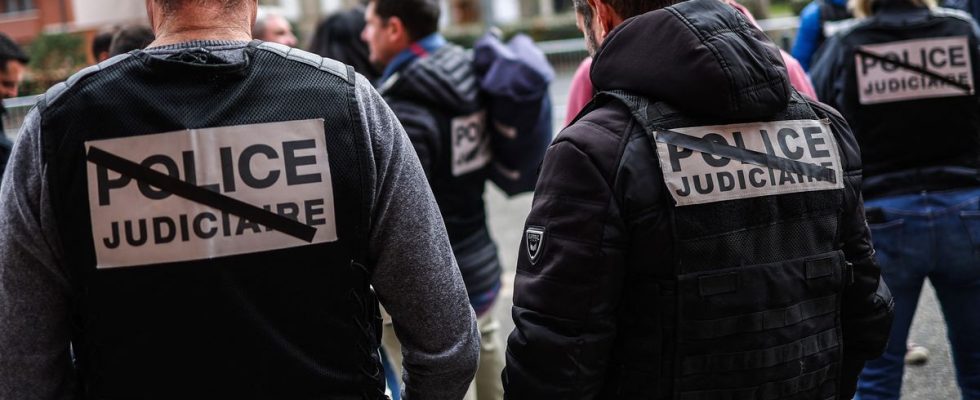The judicial police chain of successes. But in its ranks, the heart is no longer at the party. On Tuesday and Wednesday, investigators from Oclco, the Central Office for the Fight against Organized Crime, arrested several members of a team they suspect of being behind the robbery of an armored van in Germany last January. “It’s a very good deal, they have worked remarkably well”, greets a source familiar with the matter. Despite this new success, the agents are more concerned than ever: the Minister of the Interior confirmed ten days ago the entry into force, at the end of 2023, of his controversial reform of the national police, which has a particular impact on them. . “Everyone has the balls”, sums up a senior officer. With the impression that the cops of the PJ were not supported by the police unions in their fight. “We consider that they are not defending us, that is clear. »
In this same letter addressed to the 150,000 French police officers, Gérald Darmanin did not simply reject the Senate’s proposal to postpone the implementation of this reform after the 2024 Olympics. He also confirmed the establishment of a departmental director of the national police, dependent on the prefect, who will have authority over all the police services of a department. Faced with criticism of this level deemed unsuitable by investigators as well as by magistrates and parliamentarians, he announced the creation of interdepartmental directors of the national police (DIPN). An announcement that did not arouse the enthusiasm of the agents. ” It’s incomprehensible. The DIPN, nobody knows what that means, we are in the fog, ”says a commissioner of the PJ.
“PJ agents are ultra-minority”
In a press release, the National Association of Judicial Police (ANPJ), which brings together around 2,500 members (out of around 5,000 staff), denounces the “forced passage” of this “wobbly and contested” reform, but which “endorses” the main police unions. “The minister’s letter responds to the grievances we had presented and to our questions”, explains David-Olivier Reverdy, national provincial secretary and investigation referent of the Alliance union. “The minister has set a framework and given directions, as we asked him to do,” he adds. Interdepartmentalism is established through the DIPNs, the budgets and missions of the PAF and the PJ are retained. Finally, magistrates can always choose the service they want to enter. There will soon be working meetings to refine and specify the contours of these decisions. »
A position that Franck Nicol, deputy secretary general of the ANPJ, “finds it difficult to understand”. “We were moved by the unions,” he explains. Since this reform project was announced, the “pijistes” mobilized on numerous occasions to express their concerns, without however receiving strong support from the powerful police trade unions. “The agents of the PJ are ultra-minority” among their members, observes Franck Nicol, who does not lose hope of “making them understand that the best interest is to amend this reform”. “The PJ today works because there is this territorial network” that the text will unravel.
“We played our role as staff representatives”
How to explain that the unions have not stepped up to the plate against this reform which seems to be unanimous against it? Gérald Darmanin would probably have been more cautious than his predecessors. Nobody Place Beauvau has forgotten that in 2020, they had mobilized their troops and had the skin of Christophe Castaner. The Minister of the Interior at the time had hit the police by announcing the abandonment of the choke key during the arrests and asked “that a suspension be systematically considered for each proven suspicion of racist act or remarks” .
“Public security is overwhelmingly in the majority in the police, and therefore in the unions. However, this reform does not fundamentally change much for her, and mainly affects the PJ. They prefer to act on things that affect the bulk of the troops, ”analyzes Mathieu Zagrodzki, associate researcher at the Center for Sociological Research on Law and Penal Institutions (Cesdip), specialist in police and security issues. He also notes that the “main union leaders” come from public security or the CRS, and seem reluctant to mobilize against a “quite technical, organizational” reform, even though public opinion is struggling to grasp it. challenges.
David-Olivier Reverdy says he understands the persistent concern of his PJ colleagues due, according to him, to a “lack of information”. “They’re waiting to find out how it’s all going to be organised, but today we don’t have any instructions, it’s still under construction. He believes that the Alliance union – majority since its association with the Unsa police – has been “hyperactive” and “has changed the project presented by the general management”. “I made a tour of France of the judicial police, we proposed a reform project, formulated proposals which could allow a way out of the crisis. We played our role as staff representative and force of proposals, ”he assures.
New mobilization
Far from having been reassured, the officials of the judicial police are determined to continue their mobilization against this reform which they consider dangerous. The ANPJ indicated in a press release that it had requested “an audience with the President of the Republic, who today seems the only possible interlocutor to arbitrate a crisis which involves the security of citizens and the responsibility of the State”.
The association also calls on the agents to gather, next Thursday, in front of the courts at lunchtime, in order to protest alongside magistrates and lawyers.

